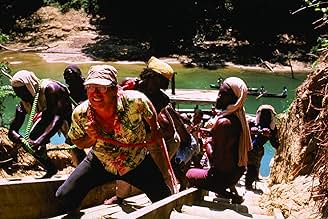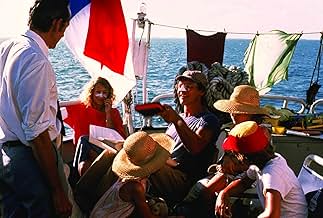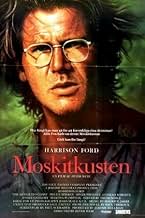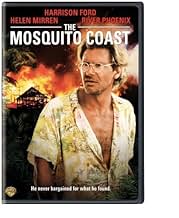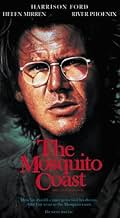AVALIAÇÃO DA IMDb
6,6/10
33 mil
SUA AVALIAÇÃO
Um inventor rejeita sua vida urbana e muda-se com sua família para as selvas da América Central para viver uma utopia.Um inventor rejeita sua vida urbana e muda-se com sua família para as selvas da América Central para viver uma utopia.Um inventor rejeita sua vida urbana e muda-se com sua família para as selvas da América Central para viver uma utopia.
- Prêmios
- 1 vitória e 3 indicações no total
Alice Heffernan-Sneed
- Mrs. Polski
- (as Alice Sneed)
- Direção
- Roteiristas
- Elenco e equipe completos
- Produção, bilheteria e muito mais no IMDbPro
Avaliações em destaque
I have read the book and watched the film, and because of Harrison Ford's uncanny portrayal of the lead character he should have received an Oscar. There is an eerie scariness in the coming to life inventor- father to a mad scientist with humanistic touches. The book gave deep and colorful look at this man, but Ford alone made him transition from words to life. A deep look at someone with high ideals who becomes disillusioned at American way of life.
The Mosquito Coast is an odd film. It attempts to talk about issues which are important and which few films address, fails to communicate them clearly, yet isn't sucked into the maelstrom of moralizing and sententiousness that films like this almost inevitably enter. Instead, it occupies some sort of odd middle ground of ambiguity and murkiness. One gets the feeling that the film is a lot like the Fox family: they know they're going upstream but they have no specific destination, and some of them really aren't sure why they're going there in the first place.
I felt from the very beginning that the film failed to define its ideals or set a sense of clear direction. Harrison Ford, in a performance which I found unconvincing (perhaps because of the inability of the film to articulate what motivated him), rambles on about everything from the Japanese to nuclear war. There's a large difference between subtlety, i.e. not spelling things out for the viewer, and incoherence. This was incoherent. We know that he's unhappy with America, but I don't know what he's really looking for, what motivates him, etc.. Maybe he doesn't know. But if that's the case, it should be made clear.
A good example of how this plays out is his attempt to bring ice to the "noble savages." Why does he do this? Because "ice is civilization." But why does he want to bring them civilization? It seemed to me that civilization was something he was having a lot of problems with. I assume that the novel explained this more clearly and the film failed to translate properly. He of course stated earlier in the film that the savages would probably think ice a sort of jewel. So? Why does this matter? Is he looking for lost innocence?
Then later in the film "Mother" says she wishes to go to Mr. Haddy's place. He responds "And live like savages?" I can only assume that he wishes to establish some sort of elementary civilization where a small community lives in peace and harmony. Or perhaps he's just looking to withdraw from everyone, as his spurning of Mr. Haddy's gifts would show. Also, a possible literary reference is the name of their craft, Victory, which is the name of a very dull Joseph Conrad novel about a man who withdraws from life and goes to live on an island. Extreme misanthropy? Unlikely.
A possible light at the end is his talk about man not being made to walk upright. Is he looking for some sort of return to primal existence? But then why invent air conditioning in Geronimo? It all adds up to a very disorganized mess, both in Mr. Fox's head, and on screen. The Mosquito Coast is like a puzzle that still has all the pieces, but rather than fit them together, Weir just threw them all in the box and let us look at them.
I felt from the very beginning that the film failed to define its ideals or set a sense of clear direction. Harrison Ford, in a performance which I found unconvincing (perhaps because of the inability of the film to articulate what motivated him), rambles on about everything from the Japanese to nuclear war. There's a large difference between subtlety, i.e. not spelling things out for the viewer, and incoherence. This was incoherent. We know that he's unhappy with America, but I don't know what he's really looking for, what motivates him, etc.. Maybe he doesn't know. But if that's the case, it should be made clear.
A good example of how this plays out is his attempt to bring ice to the "noble savages." Why does he do this? Because "ice is civilization." But why does he want to bring them civilization? It seemed to me that civilization was something he was having a lot of problems with. I assume that the novel explained this more clearly and the film failed to translate properly. He of course stated earlier in the film that the savages would probably think ice a sort of jewel. So? Why does this matter? Is he looking for lost innocence?
Then later in the film "Mother" says she wishes to go to Mr. Haddy's place. He responds "And live like savages?" I can only assume that he wishes to establish some sort of elementary civilization where a small community lives in peace and harmony. Or perhaps he's just looking to withdraw from everyone, as his spurning of Mr. Haddy's gifts would show. Also, a possible literary reference is the name of their craft, Victory, which is the name of a very dull Joseph Conrad novel about a man who withdraws from life and goes to live on an island. Extreme misanthropy? Unlikely.
A possible light at the end is his talk about man not being made to walk upright. Is he looking for some sort of return to primal existence? But then why invent air conditioning in Geronimo? It all adds up to a very disorganized mess, both in Mr. Fox's head, and on screen. The Mosquito Coast is like a puzzle that still has all the pieces, but rather than fit them together, Weir just threw them all in the box and let us look at them.
Frothing at the mouth with disgust for his homeland America, inventor Allie Fox (Harrison Ford), with family in tow, pulls up roots, and moves to Central America. Here, he proceeds to build a new life in the jungle, using his mechanical skills, his inventiveness, and in particular his patented machine, which produces ice, sans electricity. "Ice is civilization", he proclaims with unctuous authority. That will be the foundation for his utopian dream. But Allie is so headstrong, so convinced of his infallibility that his vision blinds him to reality. And the film's ending is poignant.
Delusion and self-deception breed nightmarish outcomes. And the cinema, through the years, has dramatized these themes quite well, in films like "Aguirre: The Wrath Of God", "Fitzcaraldo", and "Deliverance". In real life, delusion and self-deception were the basis for the events surrounding American preacher Jim Jones who, in the late 1970s, relocated his naive flock to the jungles of Guyana, whereupon he established Jonestown, envisioned as a religious utopia. The result was tragic.
Beyond the deep themes thus expressed in the script, "The Mosquito Coast" looks good visually. The tropical scenery is spectacular. Production design and cinematography are terrific. And the film's score, by Maurice Jarre, is wonderfully exotic and majestic.
My only complaint is the character of Allie Fox, who at some point badmouths just about everyone and everything. I could have wished for a quieter, less loquacious, madman. Then too, Harrison Ford plays Fox in a way that overrides subtext. In short, Fox not only is delusional and self-deceptive, he's also preachy, domineering, and totally lacking in compassion for others, someone whom we as viewers cannot root for or have any empathy with.
"The Mosquito Coast" reminds us that the grass is not always greener on the other side of the fence. Chasing that elusive pot of gold at the end of the rainbow is for dreamers. This is a good film to watch when you're facing a pile of problems. You could be like Allie's family, trying to forge some existence in the jungles and listening to the rants of an icy madman.
Delusion and self-deception breed nightmarish outcomes. And the cinema, through the years, has dramatized these themes quite well, in films like "Aguirre: The Wrath Of God", "Fitzcaraldo", and "Deliverance". In real life, delusion and self-deception were the basis for the events surrounding American preacher Jim Jones who, in the late 1970s, relocated his naive flock to the jungles of Guyana, whereupon he established Jonestown, envisioned as a religious utopia. The result was tragic.
Beyond the deep themes thus expressed in the script, "The Mosquito Coast" looks good visually. The tropical scenery is spectacular. Production design and cinematography are terrific. And the film's score, by Maurice Jarre, is wonderfully exotic and majestic.
My only complaint is the character of Allie Fox, who at some point badmouths just about everyone and everything. I could have wished for a quieter, less loquacious, madman. Then too, Harrison Ford plays Fox in a way that overrides subtext. In short, Fox not only is delusional and self-deceptive, he's also preachy, domineering, and totally lacking in compassion for others, someone whom we as viewers cannot root for or have any empathy with.
"The Mosquito Coast" reminds us that the grass is not always greener on the other side of the fence. Chasing that elusive pot of gold at the end of the rainbow is for dreamers. This is a good film to watch when you're facing a pile of problems. You could be like Allie's family, trying to forge some existence in the jungles and listening to the rants of an icy madman.
With much of Harrison Ford's career during the eighties dominated by his participation in George Lucas and Spielberg blockbusters, it comes as a relief to discover that in between his numerous flights on the Milennium Falcon and slashing his whip he found time to star in many low key movies. Among these hidden treasures is The Mosquito Coast, a character driven story about one mans attempt to recreate an Eden in a faraway land. And his secret to survival? Ice.
This is an interesting movie, not only because it has an all star cast, that includes River Phoenix, but because we see Harrison Ford give his all to creating a character that is multi dimensional. He is an idealist and has the best intentions, yet is doomed to failure as the viewer senses an impeding violent side to his vision which will come to destroy him.
As a movie this is a good study of man's attempt to act upon his dreams, as a lighthearted pop corn flick this will annoy the average mainstream cinema goer. Simply put, many people will find it hard to imagine Harrison Ford as anything else other than the super hero incarnation of Indiana Jones, and multi faceted anti heroes that never see the errors of their ways is a genre of cinema that Hollywood hasn't quite got their head around yet.
For everybody else who would like to see a movie that has depth, great acting and a solid script, this will be excellent viewing.
This is an interesting movie, not only because it has an all star cast, that includes River Phoenix, but because we see Harrison Ford give his all to creating a character that is multi dimensional. He is an idealist and has the best intentions, yet is doomed to failure as the viewer senses an impeding violent side to his vision which will come to destroy him.
As a movie this is a good study of man's attempt to act upon his dreams, as a lighthearted pop corn flick this will annoy the average mainstream cinema goer. Simply put, many people will find it hard to imagine Harrison Ford as anything else other than the super hero incarnation of Indiana Jones, and multi faceted anti heroes that never see the errors of their ways is a genre of cinema that Hollywood hasn't quite got their head around yet.
For everybody else who would like to see a movie that has depth, great acting and a solid script, this will be excellent viewing.
Who hasn't wondered, considered, or fantasized about leaving this whole rat race beyond and go off somewhere remote to just do your own thing? I know I have and sometimes still do. Well, the main character here, play by Ford, does just that, and he brings his entire family along with him. Despite his good intentions they are all met with considerable obstacles and challenges throughout. There were times that I felt for his character, but even more so for his wife and kids being reluctantly pulled and pushed along on his obsession. There are definitely some issues with this film, one being a lack of clarity in its message, but I still think it is worth checking out.
The Life and Times of Harrison Ford
The Life and Times of Harrison Ford
Take a look back at Harrison Ford's movie career in photos.
Você sabia?
- CuriosidadesWhile building the town set in Belize, the crew unearthed an ancient Mayan temple. It notified the Belize government, which declared the site an important historical find.
- Erros de gravaçãoThe "Ice from Fire" technique for using heat, ammonia and hydrogen was actually invented in 1824 by the English scientist Michael Faraday.
- Citações
Emily Spellgood: [to Charlie] I think about you when I go to the bathroom.
- Trilhas sonorasClap Your Hands
Words and Music by Gary Johnson
Performed by Grace Gospel Primary School Choir
Principais escolhas
Faça login para avaliar e ver a lista de recomendações personalizadas
- How long is The Mosquito Coast?Fornecido pela Alexa
Detalhes
- Data de lançamento
- País de origem
- Idiomas
- Também conhecido como
- La costa de los mosquitos
- Locações de filme
- Empresas de produção
- Consulte mais créditos da empresa na IMDbPro
Bilheteria
- Orçamento
- US$ 25.000.000 (estimativa)
- Faturamento bruto nos EUA e Canadá
- US$ 14.302.779
- Fim de semana de estreia nos EUA e Canadá
- US$ 110.313
- 30 de nov. de 1986
- Faturamento bruto mundial
- US$ 14.302.779
- Tempo de duração
- 1 h 57 min(117 min)
- Cor
- Mixagem de som
- Proporção
- 1.85 : 1
Contribua para esta página
Sugerir uma alteração ou adicionar conteúdo ausente




